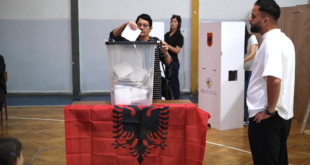After meeting with EU representatives in Strasbourg, Albania’s main political parties have failed to reach an agreement to overcome the political stalemate that has plagued the country for almost a year.
Prime Minister Sali Berisha from the ruling Democratic Party and opposition leader Edi Rama of the Socialists met with representatives of the European Parliament in Strasbourg on Thursday night. EU Enlargement Commissioner Stefan Fuele was also present for the talks.
Rama and Berisha have been locked in a stalemate over the results of the June 28, 2009 parliamentary elections, which Berisha’s party narrowly won.
The Socialists have boycotted parliament since the new session began in September, claiming that the government’s alleged fraud was to blame for their electoral loss.
In a joint statement issued on Thursday ahead of the meeting, Fuele and EU High Representative Catherine Ashton said that Albania stands at a crucial moment on its path towards EU integration and warned that a “range of domestic challenges require political courage”.
“The EU is seriously concerned about the continuing political stalemate. We are concerned about the dysfunctional parliament and the possible systemic effects across their institutions,” the statement read.
The two top EU officials added that it was high time to find a solution to the current crisis, a solution that will stand the test of time. “Albania’s prospects should not be further affected by a continuation of the status quo,” Ashton and Fuele emphasised.
The EU has expressed its support for the initiative by MEPs Joseph Daul, head of the largest centre-right group in the European Parliament and Martin Schulz, head of the largest centre-left group in the Parliament.
The initiative, put forward on behalf of the two largest political groups, encourages effective improvements to the political situation in Albania for the benefit of the citizens of the country and with a view to improving Albania’s EU perspective.
Ashton and Fuele joined the call by the European Parliament for Albanian political leaders to take responsibility for finding a national, sustainable and imminent way forward in line with the aspirations of the citizens of Albania, the Constitution and the principle of transparency.
The meeting in Strasbourg ended after midnight with the only agreement to try to organise a similar meeting in two weeks when experts from Brussels will present common points that might bring closer the stances of the two Albanian political parties.
The agreement to meet for EU-sponsored talks prompted the Socialist Party MPs and their supporters to end their 19-day hunger strike on Wednesday.
The party, which continues its boycott, has conditioned its full participation in parliament on a recount of the electoral ballots of the parliamentary poll.
Although declaring his openness to a parliamentary investigation of the election, Berisha has stubbornly rejected the possibility of a recount. He argues that the opposition has exhausted all legal options and that he cannot override the judicial process.
Albania became a NATO member state in April 2009 and has submitted its application for EU membership. The European Commission is in the process of preparing its opinion on whether the country is ready to become an EU candidate country.
The political stalemate is threatening Albania’s EU path, with concern that the country might be negatively evaluated by the EC as the parliament, a main political institution, is not functioning properly.
 Eurasia Press & News
Eurasia Press & News


